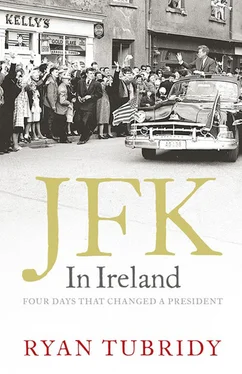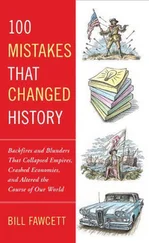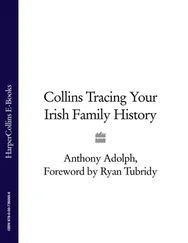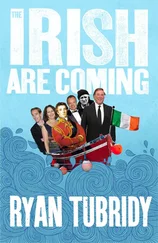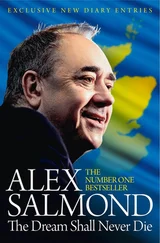It is hard to put this catastrophe into context as there is a distinct lack of contemporary reference, or indeed deference, to this tragic episode. Yet it was our Holocaust, it was the wind that sent our people like feathers from a pillow to all corners of the globe and particularly to Britain, Australia and the relatively youthful USA. Boston especially was a natural fit for the Irish. Like an exaggerated Dublin, the leafy city was as near to Ireland as a homesick peasant was going to get.
Among those who fled was John F. Kennedy’s great–grandfather Patrick Kennedy, who left New Ross, County Wexford, in 1848 for Liverpool from where he sailed to Boston. The fact that the third son of a Wexford farmer managed to cobble together enough money to pay for his voyage was an achievement in itself. While most of those on board that boat to Boston were fleeing poverty and almost certain death, Patrick saw his move to America as a search for something better. Like so many others of his generation, he would never see his parents or his brother and sister again. 4
Either during the voyage or more probably when he arrived in Boston, Patrick met a fellow Wexford woman, Bridget Murphy.The two married in Boston, had four children and Patrick supported the family through his work as a cooper, making barrels and casks. It was in Boston that four families – the Fitzgeralds and the Kennedys, the Murphys and the Coxs – would mix, work and intermarry. It was here too that the upwardly mobile next generation would endeavour to shed their links with the old country. To this second generation, Ireland would represent a past without promise, a land of impoverished indignity and political impotence.
The Land of Opportunity was a harsh one for immigrants of all nationalities, but the Irish were on the lower rungs of society in 19th–century America and the attitude to them was ugly. Job adverts frequently read “No Irish need apply” and they could only find accommodation in ghettos, nicknamed “Paddyville” or “Mick Alley”, despite the fact that by 1850, a third of the population of Boston was Irish. They were seen as filthy, hard–drinking Catholics, under the thumb of the Pope. They also spoke in an accent no one could understand but their own people. Most Irishmen found work as manual labourers, and the paltry salaries meant they had to live in slum conditions. The only way to survive was to work long, back–breaking hours, and although the shops stocked plenty of food, unlike those back in Ireland, the Irish couldn’t afford to buy much of it. Like many of his fellow immigrants, Patrick Kennedy died prematurely after just ten years of this new life.
Alone, with four children to raise, Bridget embodied what would become the Kennedy work ethic. She worked as a shop assistant, took in lodgers and cleaned houses. When she had saved up enough money, Bridget bought the shop she worked in, expanded the business and started selling groceries and alcohol. She was going to raise her family’s standard of living through sheer determination and grit, even if it killed her, as it had her husband.
Patrick Joseph Kennedy (John F. Kennedy’s grandfather) was just one year old when his father died. Given that three in ten children living in American cities perished before the age of one in the mid–19th century, and the fatherless were more vulnerable than most, it was a miracle that he survived at all. Known to all as PJ, he left school at fourteen and worked on the Boston docks. Like his mother, he was a good saver and with some financial help from Bridget, PJ bought his own saloon in East Boston. By the time he hit thirty, PJ owned three such saloons and ran a side business importing whiskey.

The Kennedy coat of arms and family tree. Down the left side are the names of Kennedy ancestors, beginning with Lorcan, King of Munster. At the top of the chart is an excerpt of a poem by Giolla that dates back to 1420.
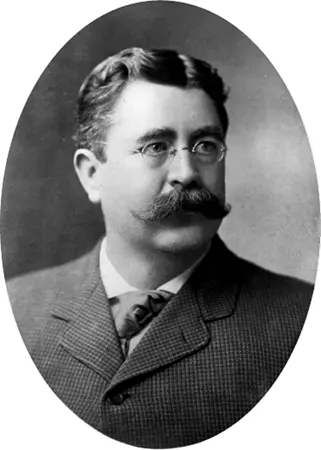
Patrick J. Kennedy, paternal grandfather of JFK.
Around Boston, PJ Kennedy was seen as a fixer, somebody who could get things done, a good guy who was always ready to do a favour for you. He dispensed advice across the bar in his saloons, helping men to find jobs and mothers to get medical help for sick babies. He had an ability to listen, as well as an eloquence that won him friends wherever he went, so when he decided to run for public office in 1884, he had plenty of people willing to vote for him. He was a perfect fit for the offices he was about to win, first in the Massachusetts State Legislature and later in the State Senate. The brief generational journey from a devastated port in Wexford to the state political ladder was not typical – not unless you were a Kennedy – but he was setting a pattern for the generations to come.
With his professional and political situation in hand, PJ turned to the personal, and for this he set his sights on Mary Augusta Hickey. Always aiming slightly above his station, PJ didn’t mind that Mary was from a “better” Irish–American family, wealthier than his own; he knew his mind. Opportunities for social advancement were limited in the notoriously snobbish world of Boston high society, particularly if you had Irish Catholic heritage, and Mary knew it. This was a society that was as anglicised as it was rarefied. The rulers of this pompous roost were the Boston Protestant élite – the so–called Boston Brahmins, made up of a select number of Boston families who celebrated each other at parties, in politics and in toasts:
And this is good old Boston,
The home of the bean and the cod,
Where the Lowells talk only to Cabots,
and the Cabots talk only to God.
Yet Mary Augusta Hickey was won over by PJ’s affability and ambition and in 1887 she duly became Mrs Mary Kennedy, then gave birth to a son on 6 September, 1888. Rather than calling her first–born after his father, as was the norm, the class–conscious Mrs Kennedy christened the boy Joseph Patrick, and as he grew older, his mother always introduced him as Joseph. 5His friends would call him Joe. The Irish name Patrick was a scar from an unwanted past that she preferred to remove.
Over the next decade, life improved for many Irish–Americans and none more so than for Mary and PJ. In 1901, the respectable couple sent young Joe to Boston Latin, a Protestant secondary school that boasted such alumni as Benjamin Franklin. Joe stood out from the start. Despite being one of a handful of Catholics in a Protestant school, the boy thrived and was so popular among his classmates that he was elected class president. He did well enough at school to be accepted as a student at Harvard University, where he played on the baseball team.
Harvard boasted a number of college clubs, which granted privileged access to the Old Boys’ Network and should have given Joe a headstart in one of the big brokerage firms in Boston. However, despite his popularity and his many achievements at Harvard, to the well–groomed Wasps of Ivy League colleges, Joe was still a ‘Mick’. He had two strikes against him: he was too Catholic and his family’s money was too new, so he found himself blackballed from the most influential clubs. Kennedy would never forget this rejection.
History had different plans for Joseph Patrick Kennedy and all who would follow him. Left to blaze his own trail, Joe got a job as a bank examiner and in 1913, he made his first big deal when he borrowed enough money to take control of the Columbia Trust Company, the Boston–Irish bank his own father had helped to set up in 1892, while it was being threatened with takeover. 6He had a genuine gift for business and over the next few years would make a fortune speculating on the stock market.
Читать дальше
